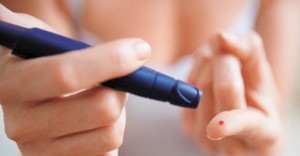By James M. Davenport, Au.D. – Lake County Hearing & Balance Clinic –
 Certain medical illnesses or conditions can predispose individuals to hearing impairment. The natural aging process being the largest factor however certain illnesses and lifestyle choices can also contribute to the onset of hearing impairment. Among them are noise exposure ototoxic medications, cardiovascular disease, smoking, and even obesity. But they are not the only medical complications.
Certain medical illnesses or conditions can predispose individuals to hearing impairment. The natural aging process being the largest factor however certain illnesses and lifestyle choices can also contribute to the onset of hearing impairment. Among them are noise exposure ototoxic medications, cardiovascular disease, smoking, and even obesity. But they are not the only medical complications.
Diabetes has been linked to hearing impairment, with a large number of diabetics suffering from decreased hearing. While primary care physicians have been encouraging diabetics to regularly examine their vision, screening for hearing impairment has been grossly neglected.
Diabetes is a chronic and potentially fatal disease, marked by high levels of sugar in the blood. A diabetic individual doesn’t produce or properly use insulin (a hormone needed to convert sugar, starches and other food into energy needed for sustaining daily life).
This is a simplified description of this complex debilitating illness, which, according to the American Diabetes Association (ADA) impacts about 23.6 million Americans. It is possible that symptoms such as blurry vision, fatigue, excessive thirst, weight loss, and frequent urination may be attributed to other conditions or ignored altogether.
While there is treatment for diabetes including medication, healthy diet, and an exercise program it was the seventh leading cause in the United States in 2006, according to ADA. The numbers are alarming and if you or anyone you know suffers from this disease, you should take all the medically sound precautions. And while you’re at it, have your hearing tested as well.
Here’s why you should:
Hearing loss due to diabetes is typically a high frequency sensorineural (nerve) hearing loss which can be treated successfully with hearing aids. The earlier a hearing loss is diagnosed the earlier it can be treated. Studies have shown that untreated hearing loss can have a negative impact on quality of life, and conversely, treating hearing loss has a very positive impact on quality of life. Thus for diabetics, the sooner the hearing loss is treated the better.
James M. Davenport, Au.D.
Lake County Hearing & Balance Clinic
Florida Waterman Hospital
352.343.4488
www.lakecountyhearingclinic.com
Check Also
Recurrent UTIs: Addressing the Risk of Antibiotic Resistance
Urinary tract infections (UTIs) are common bacterial infections that affect millions of individuals worldwide each …
 Central Florida Health and Wellness Magazine Health and Wellness Articles of the Villages
Central Florida Health and Wellness Magazine Health and Wellness Articles of the Villages



